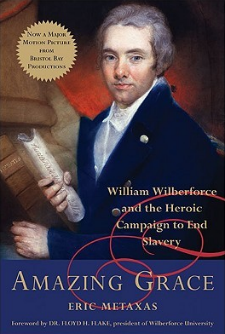
Had I not just read
Twelve Years a Slave I might have thought that Metaxas was a bit over the top in his description of the slave trade but his text serves only to parallel one liberator with one slave at the same time. Some slave owners in the USA did see their slaves as chattels not people, treating them as little better than animals, and one UK judge said that from the point of view of English law, throwing slaves in the ocean was just ‘as if horses had been thrown overboard‘. (p 114).
Shortly before Christmas I witnessed a performance of
The Liquid Plain by Naomi Wallace at the Oregon Shakespeare Festival Theatre in which a small group of early 19th century captains and shipmates in Rhode Island recounted stories lost in history. I winced as a sea captain explained that he was never involved in the slave trade. He was a ship’s captain. His job was to carry cargo from Africa to America. Sometimes when the sea got rough cargo had to be dumped. These were not slaves nor even people — just cargo.
Against this background Metaxas offers an interesting, informative, very readable and factual account of Wilberforce’s life from childhood through to the abolition of the Slave Trade, presenting him as an intellectual character with a mind of his own, refusing to sign the 39 Articles when getting his degree because he was unsure about some of the Anglican tenets, and responding to stronger influences from the likes of Wesley, Whitfield, Doddridge and Newton, leading to his conversion. Due recognition is given to support from the Dissenters (especially Methodists and Quakers), Granville Sharpe and the Clapham Sect, and to the opposition, including the Church of England, with vested interests in the West India Plantations.
Victory, when it came in 1807, was only the abolition of the Slave Trade, not slavery. Slaves continued long after and Wilberforce knew it, but at least it was the beginning of the end, so full marks to Metaxas when he says , ‘The slave’s humanity had been established; now it must be honoured’ (p 227).
Unfortunately, in the introduction, he then rather blots his copybook with an encomium and a batch of extravagant claims, such as that he ‘destroyed an
entire way of seeing the world . . . overturned the European civilisation’s view not only of slavery, but of almost everything in the human sphere . . . was simply the greatest social reformer in the history of the world . . . . (and that) . . . the America we know wouldn’t exist without Wilberforce’.
Likening him to someone who finds a cure for a disease that is ravishing the world so that ‘no one suffers from it again— and within a generation or two no-one remembers it ever existed’, may be heart-warming but unnecessary and hardly true when one thinks of trafficking, child abuse and many other forms of slavery around the world.
After the harrowing experience of
The Liquid Plain my first thought was to thank God that at least we don’t treat people like that any more. My second was to realise how wrong I was when I thought of the way we still move people around as if they were cargo and allow all manner of exploitation.
None of this however should detract from the book as a whole. Read it. Read
Twelve Years a Slave (or see the film) and if
The Liquid Plain comes anywhere near, don’t miss it.